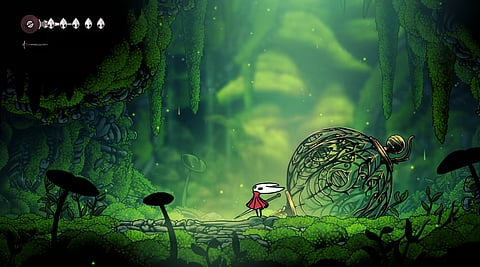
- News
- Campus
- Exam
- Podcast
- Web Stories
- Do You Know
- Path Finders - UG Programs
- Videos
- Élitscape

Written by Anusha Ganapathi for The New Indian Express
A concept I have lately struggled with is the idea of things being difficult. I shouldn’t have to wait more than 10 minutes to book a cab. I can’t handle cooking food that takes more than an hour of preparation. And god forbid I write a line of code that fails more than three times — I would seriously reconsider my career, wouldn’t you? So you can imagine the fairly systemic shock that I went through when I started playing Hollow Knight: Silk Song. I’m honestly surprised that this game has sold over three million copies already. That’s three million people putting themselves through the above-described extreme discomfort and difficulty in a video game! And for those of you who don’t know about this long-awaited sequel, I’m just about to explain it to you.
Hollow Knight is a Metroidvania game released in 2017 by a very small team of people. It broke out quite dramatically in gaming circles and was best known for its challenging game style — similar to Souls-like games. And ever since the first game released, the world has been waiting for Silk Song to come out. Silk Song was released earlier this month and it’s even more complex and larger than the first game.
Now that you have the basics, I’ll get into why this game has sent me into an existential spiral. In Silk Song, you play as Hornet, a character who is only (sort of) revealed in Hollow Knight. She is a powerful princess who finds herself thrown into the cursed lands of Pharloom. The people there are followers of the Citadel, and along her journey, she finds several dedicated pilgrims who put themselves through the arduous journey to the summit. I believe the gameplay, too, intentionally adheres to the overall themes of religion and suffering, because I felt that I underwent some form of intense “penance” as I played it.
Silk Song is a horrid game. It’s mean, it’s harsh, and it’s unforgiving. But I am slowly beginning to understand why I (a person who hates failing) have already spent 40 hours on the game.
You see, Hornet’s journey made me discover that achievement in the absence of pain is utterly meaningless. Silk Song did really drive this point home. What is Hornet’s story to me — the player? Honestly, nothing. I don’t care if she defeats a boss called “the Fourth Chorus” by driving a rock of lava through her head. It doesn’t matter to me if she succeeds or fails. What mattered was that it took me 40 consistent attempts to get there. Trying repeatedly and failing somehow created meaning to the entire experience.
Silk Song manages to make success feel just out of your reach. It teases you: If you try again, maybe this time, you will make it past the first level of mushroom flowers in the platforming part of the level; or perhaps, if you nail the rhythm of the boss fight, you will nail it in the next attempt. It never feels punishing in the sense of being impossible to achieve. But the game seems to tell you that you have it in you, and you just need a little more precision or patience. Where it is unfair and horrible to you is in the dreaded paths of pain. The checkpoints are placed very far apart from the final boss fights where you could finish an elaborate series of platforming jumps and challenges, only to die and be thrown all the way back.
Apart from the more philosophical reasons for playing something this challenging, there are other things that make the game good. For example, if you are tired of failing the same challenge repeatedly, the world has multiple open paths of exploration to change things up for you, which is classic Metroidvania design. If you’re someone who appreciates the art and lore of games, the music, and the bell imagery has a lot of meaning to the overall lore and structure (which circles around religion), and the art style of the new biomes and the enemy design also holds a lot of meaning.
Would I recommend Silk Song to you? Probably not. You might be better off playing something that’s a little less challenging, or just picking any other activity that is more meaningful to you. But if you, like me, feel the need to pick up some life lessons, then it’s worth giving Silk Song a shot. But it’s definitely not meant for absolute beginners to video games.
Silk Song is currently available across consoles — PC, Xbox, Nintendo Switch, and PlayStation. I played it with a controller on the PC, as well as the ROG Ally (handheld). I played the version that came bundled along with the Xbox PC Game Pass.
